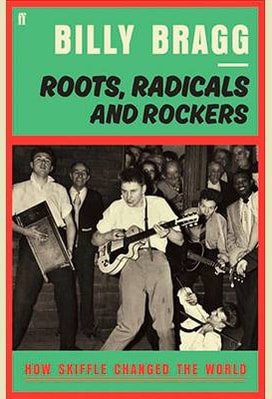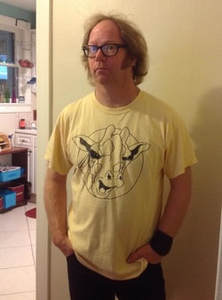Sacred Chickens
Menu
SACRED CHICKENS
 Roots, Rockers and Radicals: How Skiffle Changed the World by Billy Bragg Faber & Faber 2017 Review by Roy Peak Before I read this book, my knowledge of Britain’s skiffle scene was from reading little anecdotes in the histories of various English rock groups. Anecdotes such as “John Lennon met Paul McCartney when they both played in skiffle groups in Liverpool,” or “Pete Townshend played in several skiffle bands before joining the Who.” But what exactly was a skiffle group and why were they so influential to Britain’s music scene in the late 1950s? The easy answer is that skiffle was a type of music played by young folks in England during the 1950s, influenced mainly by American jazz, blues, and folk as well as English folk songs. The longer answer is all that, PLUS add to it the fact that as much as skiffle had in common with—and sounded similar to—rockabilly and early rock ‘n’ roll, it had developed mostly on its own, independent from the pop music of the day. This was rebellious music of a D.I.Y. ethic often utilizing handmade instruments such as washboards and the one-string tea chest bass. But what I really found intriguing was that this music started out as a lark. A local trad jazz band decided to add some variety to their shows by playing a few Lead Belly and Woody Guthrie songs on guitar between their regular jazz sets. Something to break up the regular jazz routine. One of these musicians, Lonnie Donegan, played with a great sense of abandon, ratcheting up the tempo and the volume on the songs to the audience’s delight. Eventually more people were showing up for the mid-show entertainment than the regular night’s jazz. As the guitar was not strictly a popular instrument in England at the time, the critics were dismissive, but the kids were immediately won over. Once a few record labels got wind of the burgeoning popularity of this new sound and released a few albums, sales of guitars skyrocketed overnight as practically every teen in England started a band, if only to play at coffee houses or school cafeterias. Skiffle contests were a huge thing the country over, with groups of young Brits vying to win the local heat and advance to the next level, hoping to win the big prize: a chance to make their own record. I do believe that this helps to explain how the British Invasion happened to be so big, so explosive. The kids were already primed and ready, and the amount of kids in bands around the country, all fighting for attention, were a huge pool of talent just waiting to be tapped, not to mention the hundreds of thousands of fans waiting for the next big thing to happen. Throngs of school girls would scream their lungs out as their favorite bands hit the stage, in a prelude to Beatlemania years later. I always saw the screaming fans during the Beatles’ shows as coming out of nowhere, but now it all makes sense. This had been building up for years, the Fab Four were simply the latest and biggest band at the time to command that sort of attention, and the kids went wild as soon as they had the chance. Being a gifted songwriter serves Bragg well here, as he’s economical, yet full of imaginative detail, his research is impeccable, and he has a strong sense of how to tell a story. A great, fun, fast, informative read.  Roy Peak has played electric bass in more bands than he cares to remember for more years than he can remember. He wrote the theme song for the Utica, New York radio show "Hey You Kids, Get Off My Lawn" on WPNR-FM. His solo debut album, All Is Well, has been called "Loud, cacophonous, and beautiful by a truly unique artist." His short fiction has been published in The Dead Mule School of Southern Literature and he writes music reviews for the King Tut Vintage Album Museum of Jacksonville.
0 Comments
Leave a Reply. |

Click Photo above to buy ebook or paperback from Amazon.
Here's the link to Barnes and Noble Or order through your favorite independent bookstore! Categories
All
|
 RSS Feed
RSS Feed